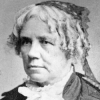Maria Mitchell

Maria Mitchell
Maria Mitchell was an American astronomer who, in 1847, by using a telescope, discovered a comet which as a result became known as "Miss Mitchell's Comet". She won a gold medal prize for her discovery which was presented to her by King Frederick VI of Denmark. On the medal was inscribed "Non Frustra Signorum Obitus Speculamur et Ortus" in Latin. Mitchell was the first American woman to work as a professional astronomer...
NationalityAmerican
ProfessionScientist
Date of Birth1 August 1818
CountryUnited States of America
Every formula which expresses a law of nature is a hymn of praise to God.
To read a book, to think it over, and to write out notes is a useful exercise; a book which will not repay some hard thought is not worth publishing.
We especially need imagination in science. Question everything.
I am always the better for open-air breathing, and was certainly meant for the wandering life of the Indian.
In my younger days, when I was painted by the half-educated, loose and inaccurate ways women had, I used to say, "How much women need exact science" But since I have known some workers in science, I have now said, "How much science needs women"
Why can a man not act himself, be himself, and think for himself? It seems to me that naturalness alone is power; that a borrowed word is weaker than our own weakness, however small we may be.
People have to learn sometimes not only how much the heart, but how much the head, can bear.
The greatest benefit derived from the study of science is that it lifts you out of and above the littleness of daily trials. We learn to live in the universe as a part of it; we cannot seperate ourselves from it - our every act connects us with it - our every act affects the whole. Standing under the canopy of stars and remembering their presence you could scarcely do a petty deed, or think a wicked thought.
Do not look at stars as bright spots only. Try to take in the vastness of the universe.
Besides learning to see, there is another art to be learned - not to see what is not.
The greatest object in educating is to give a right habit of study.
We travel to learn; and I have never been in any country where they did not do something better than we do it, think some thoughts better than we think, catch some inspiration from heights above our own.
The world of learning is so broad, and the human soul is so limited in power! We reach forth and strain every nerve, but we seize only a bit of the curtain that hides the infinite from us.
When we are chafed and fretted by small cares, a look at the stars will show us the littleness of our own interests.